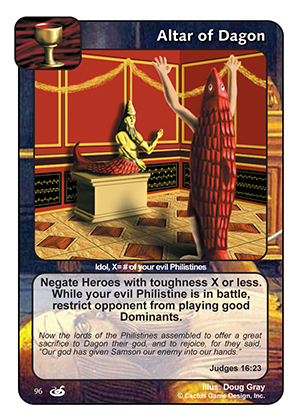What do you value most? Your Redemption collection? The high of being on the cutting edge of the next meta strategy? If you are super spiritual, you might even say that you value God most. That is good, but have you ever thought about what God values most? Although Christ loved us enough to die and bear the full weight of the wrath of God for our sin, we cannot be what He values most. That would be idolatrous, right? Then again, if He values Himself above all else, wouldn’t that make Him narcissistic? Let’s dig into 1 Samuel 5 and see what God reveals about His greatest priority—what He values supremely.
In part 3 we read of the Philistines bringing defeat and despair on the Israelites. It was bad, but there was another element of the whole incident that is often lost on us. There was a bigger problem. God, the sovereign ruler of the universe who orders all things, looks like a wimp in the eyes of the Philistines. In that day, battles were not merely about whose army was stronger or who was better equipped; it was also about whose gods were stronger. It was a “my dad can beat up your dad” kind of situation. Israel was just crushed, and the symbol of God’s presence was stolen; therefore, Israel’s God was defeated by Dagon, one of the deities of the Philistines. Of course, this wasn’t the reality of the situation, but this is likely how the Philistines saw it. The special ability of the Temple of Dagon makes sense not just because it falls in line with the other evil fortresses that protect a particular nationality of evil characters. It also fits because the Philistines actually thought that Dagon made a difference in battle—he would protect them from capture on the battlefield (or territory, the case of the card). To make it worse, Dagon wasn’t even tough looking. Redemption accurately depicts him in the Altar of Dagon artifact—he had the upper body of a man and the lower half of a fish. He was a reverse merman. From all appearances, the God of Israel was just beat up by a merman. They add insult to injury by placing the Ark of the Covenant beside the altar of Dagon as if the Lord were in a posture of reverence before the pagan deity. God will soon correct this misunderstanding.
Now the Philistines took the ark of God and brought it from Ebenezer to Ashdod. 2 Then the Philistines took the ark of God and brought it into the house of Dagon, and placed it beside Dagon. 3 When the Ashdodites got up early the next day, behold, Dagon had fallen on his face to the ground before the ark of the LORD. So they took Dagon and set him back in his place. 4 But when they got up early the next morning, behold, Dagon had fallen on his face to the ground before the ark of the LORD. And the head of Dagon and both palms of his hands were cut off on the threshold; only the torso of Dagon was left. 5 For that reason neither the priests of Dagon nor any who enter Dagon’s house step on the threshold of Dagon in Ashdod to this day. Now the hand of the Lord was heavy on the Ashdodites, and He made them feel devastated and struck them with tumors, both Ashdod and its territories. 7 When the men of Ashdod saw that it was so, they said, “The ark of the God of Israel must not remain with us, because His hand is severe on us and on Dagon our god.” 8 So they sent word and gathered all the governors of the Philistines to them, and said, “What shall we do with the ark of the God of Israel?” And they said, “Have the ark of the God of Israel brought to Gath.” So they took the ark of the God of Israel away. 9 After they had taken it away, the hand of the Lord was against the city, creating a very great panic; and He struck the people of the city, from the young to the old, so that tumors broke out on them. 10 So they sent the ark of God to Ekron. And as the ark of God came to Ekron, the Ekronites cried out, saying, “They have brought the ark of the God of Israel to us, to kill us and our people!” 11 Therefore they sent word and gathered all the governors of the Philistines, and said, “Send away the ark of the God of Israel and let it return to its own place, so that it will not kill us and our people!” For there was a deadly panic throughout the city; the hand of God was very heavy there. 12 And the people who did not die were struck with tumors, and the outcry of the city went up to heaven.
1 Samuel 5:1-12
God starts off by making the very idol of Dagon fall on its face before the Ark of God. The Philistines didn’t quite get the message yet. God curses whichever territory the Ark is in with tumors and a deadly panic which falls on the people. They start playing hot potato with the Ark by passing it from one city to another, and the curse follows the Ark into whatever city it is passed off to. The point is, God was sending a message as to who was causing the distress among the Philistines. It was no coincidence that the plagues did not hit all the Philistines everywhere all the time. It was concentrated to the territories that held the Ark. God was sending a message—He was in control, not them, and certainly not Dagon. His reputation was on the line. His worth and worthiness was on the line. His glory was at stake.
Conclusion and Application
Why was it so important that God put Dagon in his place and clearly establish Himself as the real God in town? Why does God’s reputation, or glory, matter to Himself so much? As John Piper is fond of saying, “God’s glory is uppermost in His affections.” God values His glory above all things. This is not egotistical or petty, this is the only reasonable end given the truth of the matter. When we sin, it is because we value something more than God—our idolatrous hobbies, our prestige, money, and so on. Anything that we value more than God is an idol by definition. Why then, would it be right that God should value anything more than Himself when He is supremely valuable? Would that not also be idolatry? Of course, it would be! God’s glory is uppermost in his own affections because He is the only One truly worthy to be valued above all things. God is revealing something of Himself in this chapter that is consistent throughout Scripture—He is awesome, and His greatness displays His glory. This is also emphasized by the fact that He does something very unusual—He is working independently of anyone to accomplish His ends. Typically, He works through His people—He worked through Moses, Abraham, Paul, and the rest. He didn’t have to, but that is how He chooses to work. Except this time. His glory is of such importance that God is breaking His usual method of doing things and taking it in His own hand. It is that important. It is good to be reminded of the One who is truly worthy of our affection, namely, God the Father who sent Jesus to redeem us that we might be united to Him through His Spirit. What a bizarre thought—the most beautiful and glorious being in the universe saw fit to save us hostile rebels so that we might live out our chief end. The Westminster Shorter Catechism sums up our purpose quite nicely; “Man’s chief end is to glorify God, and to enjoy Him forever.” God’s glory is His top priority, and it must be ours as well.
To buy singles, sealed product, and other gaming supplies mentioned, please visit our sponsors!

